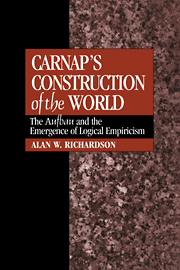Book contents
- Frontmatter
- Contents
- Acknowledgments
- Introduction
- 1 Reconstructing the Aufbau
- 2 The problem of objectivity: An overview of Carnap's constitutional project
- 3 An outline of the constitutional projects for objectivity
- 4 The background to early Carnap: Themes from Kant
- 5 The fundamentals of neo-Kantian epistemology
- 6 Carnap's neo-Kantian origins: Der Raum
- 7 Critical conventionalism
- 8 Epistemology between logic and science: The essential tension
- 9 After objectivity: Logical empiricism as philosophy of science
- Bibliography
- Index
5 - The fundamentals of neo-Kantian epistemology
Published online by Cambridge University Press: 30 October 2009
- Frontmatter
- Contents
- Acknowledgments
- Introduction
- 1 Reconstructing the Aufbau
- 2 The problem of objectivity: An overview of Carnap's constitutional project
- 3 An outline of the constitutional projects for objectivity
- 4 The background to early Carnap: Themes from Kant
- 5 The fundamentals of neo-Kantian epistemology
- 6 Carnap's neo-Kantian origins: Der Raum
- 7 Critical conventionalism
- 8 Epistemology between logic and science: The essential tension
- 9 After objectivity: Logical empiricism as philosophy of science
- Bibliography
- Index
Summary
all the creative Kantian reconstruction in Chapter Four was not simply make-believe, although it may well have been a bit of “leading” history. It was, indeed, designed to lead naturally into a discussion of the foremost neo-Kantian thinking on the exact sciences in the first quarter of the twentieth century. I have in mind neo-Kantian philosophy as articulated by authors such as Ernst Cassirer (1910, 1921), Bruno Bauch (1911, 1914), and Paul Natorp (1910a, 1910b). I shall consider only the works of these three philosophers in this chapter, because they are the neo-Kantians who most influenced Carnap's thinking. Bauch was Carnap's dissertation director and the philosopher from whom Carnap learned what he knew about Kant. Cassirer's Substanzbegriff und Funktionbegriff (Substance and function) (1910) was clearly the most systematic discussion of the general neo-Kantian line on science and mathematics; as we have already seen in Chapter Two, Carnap's references to it in Der logische Aufbau der Welt show a deep appreciation of some of its central points. Moreover, Cassirer's (1921) monograph on the theory of relativity, Zur einstein'schen Relativitdtstheorie (On Einstein's theory of relativity) was the most methodologically sophisticated and technically informed neo-Kantian discussion of the issues raised by relativity. As for Natorp, Carnap, in a letter to the conventionalist physicist Hugo Dingier in 1920, indicated that Natorp was the neo-Kantian whose views on mathematics and physical methodology had most occupied his thinking during the writing of his dis-sertation.
- Type
- Chapter
- Information
- Carnap's Construction of the WorldThe Aufbau and the Emergence of Logical Empiricism, pp. 116 - 138Publisher: Cambridge University PressPrint publication year: 1997
- 1
- Cited by



